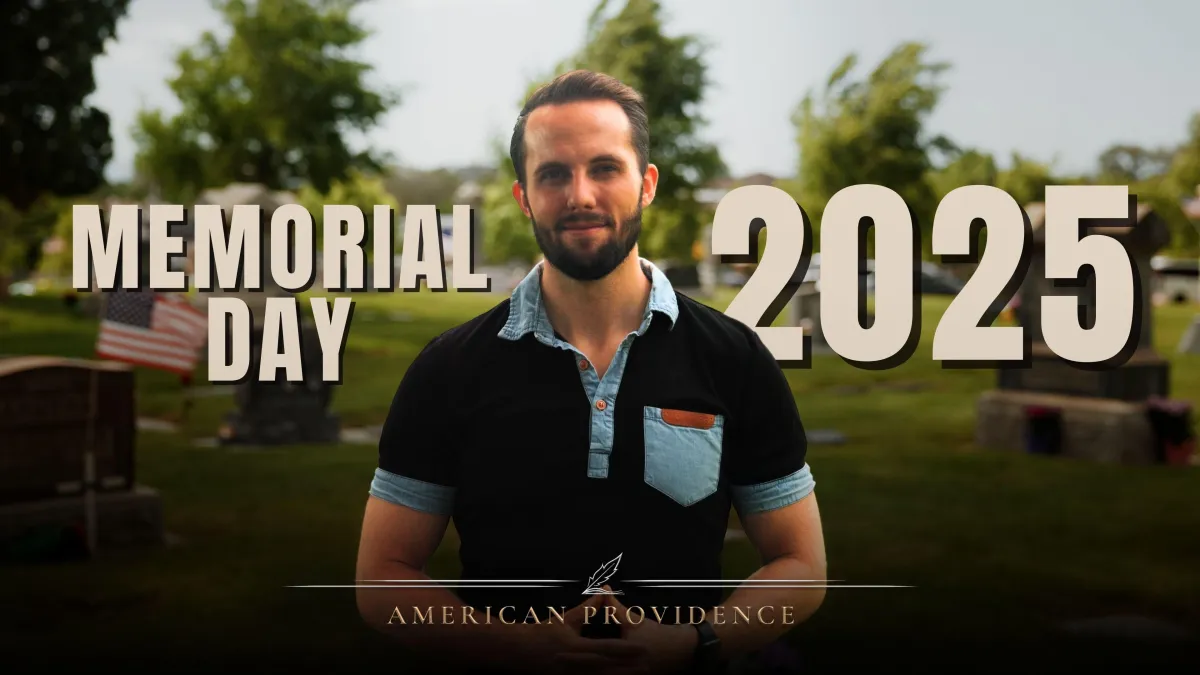
Memorial Day 2025 | Honoring Heroes Like Ross A. McGinnis
“Greater love hath no man than this, that a man lay down his life for his friends.” - John 15:13
✍️ This Memorial Day, remember the powerful legacy of those who’ve sacrificed for freedom—like Ross McGinnis—and discover how honoring their lives helps us embody America’s deepest values.

🎖️ A Tale of Valor
It’s December 4th, 2006.
Ross A. McGinnis, a 19-year-old Army machine gunner, is atop his armored Humvee, patrolling the war-torn streets of Adhamiyah in Baghdad, Iraq.

Though just nineteen, McGinnis already knew something many men twice his age struggle to comprehend: one of the highest callings in life is to sacrifice for others. That understanding first came to him as a kindergartner; when asked by his teacher what he wanted to be when he grew up he responded “an army man.” Now over a decade later as his patrol passes by a hollowed-out apartment building, chaos erupts: an insurgent’s grenade lands inside the Humvee through the open hatch. Without hesitation, McGinnis shouts “Grenade!” and then, in an extraordinary moment of clarity, recognizing that the men inside the Humvee have nowhere to go, McGinnis throws himself onto the grenade, absorbing the explosion and saving the lives of his four fellow soldiers.
That day, Ross gave his life so others could live.
Stories like that of Ross McGinnis speak to something profound within us all. They remind us that the true measure of our lives isn’t found in what we gain, but in what we give. This ideal is embodied perfectly in the greatest sacrifice ever made—the sacrifice of Jesus Christ.
In John 15:13, the Savior taught, “Greater love hath no man than this, that a man lay down his life for his friends.”
This Memorial Day, we honor those who have sacrificed for our freedom, peace, and well-being—whether soldiers like Ross, beloved family members, or our Savior Himself. Let’s reflect together on why we honor their sacrifice and how we can truly live in a way that respects their legacy.
🇺🇸 Understanding True Sacrifice
In the context of memorial day and other important national holidays we often hear talk of sacrifice, but how well do we actually understand it? Sacrifice is about giving up something precious for something greater.
In the Bible, God commanded the Israelites to offer sacrifices of the best of their flock in recognition of their dependence on him. In this way the Israelites sacrificed something precious–the life of a spotless lamb–for the greater cause of turning their hearts to God. Similarly, Christ gave his priceless life so all repentant people can receive forgiveness and live with God forever.
This idea of giving up something precious for something greater is central to America’s identity, woven deeply into our Judeo-Christian heritage and the ideals of our nation. The first pilgrims sacrificed home and comfort to build a land of religious freedom. Revolutionary soldiers sacrificed their safety and lives to free us from tyranny. Brave men stormed Normandy’s beaches in World War II to protect freedom from fascism, and countless everyday heroes—mothers, fathers, teachers, friends—continually give selflessly for the greater good.
Whether we recognize it or not, America’s greatness is rooted in sacrifice. The noble willingness to put aside immediate desires for a higher purpose reflects humanity at its very best. America is not great because of her wealth, her influence, or her baseball teams. America is great because of the sacrifices of the men and women who made those things possible. Yet when we lose sight of sacrifice, prioritizing selfishness and immediate gratification instead, we risk losing our national character, weakening the moral pillars of our republic. Remembering those who sacrificed for us reminds us to live honorably, generously, and courageously, acknowledging their legacy by embodying the virtues they fought for.
We might not all be called to war or dramatic acts of bravery, but we each have opportunities every day to choose sacrifice—giving our time, energy, and resources to uplift those around us. Maybe we sacrifice our time to offer a ride to a stranger, or we sacrifice our need to be right to foster understanding, or perhaps we sacrifice some of our earnings to support those impacted by natural disasters. Whether great or small, honoring the sacrifices of others helps us choose this higher, more fulfilling path.
🤝 Honoring Through Action
But what does it mean to honor the sacrifice of others? Very often we speak of honoring God, our veterans, first responders, and others. We also love and honor our ancestors as well as close friends and family members who have passed on. However, to honor means not only holding someone in high esteem but living in alignment with the values for which they stood. True honor isn’t merely expressed through words or ceremonies—though these are important—but more powerfully through actions. Honoring the fallen means actively upholding the freedoms, principles, and values they sacrificed to preserve.
In our discipleship, we honor Christ’s sacrifice by loving our neighbors, serving selflessly, and following His teachings. In civic life, we honor our veterans and founders by defending the Constitution, advocating for justice, and voting responsibly. Within our families, honor manifests as dedication, love, and loyalty—valuing relationships above temporary personal desires.
Imagine a world where we don’t just honor heroes and our deceased loved ones by what we say but by how we live. That world would closely resemble the kingdom of heaven on earth—a society rooted in kindness, sacrifice, integrity, and love.
💭 An Invitation
This Memorial Day, let’s reflect deeply on the stories of heroes like Ross A. McGinnis. Let’s truly honor their sacrifices by committing ourselves anew to live with integrity, generosity, and courage. By embodying the commandments of God, defending our constitutional principles, and nurturing our families, we fulfill the purpose behind Memorial Day.
Sources
https://www.army.mil/medalofhonor/mcginnis/
🦅 Follow us on social media for more American content 🦅
www.american-providence.org/link-in-bio
🇺🇸🇺🇸🇺🇸



X
Facebook
Instagram
Youtube
TikTok